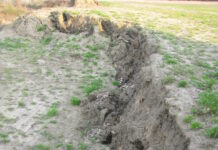Photo credit: DiasporaEngager (www.DiasporaEngager.com).
Israel’s nuclear posture remains “deliberately ambiguous.” In the past, this stance appears to have been sensible, even incontestable. Today, however, during a continuing Gaza War and following unprecedented missile aggressions from Iran, it requires fundamental reconsideration. In essence, there are compelling reasons to argue that Israel’s traditional “bomb in the basement” posture is no longer tenable.
There are clarifying particulars. A prudent nuclear posture for Israel should necessarily be based upon calculable assessments of all plausible options. At a minimum, any cost-effective changes of Israeli nuclear ambiguity would need to be readily identifiable but also not be gratuitously provocative. For a time, such changes might need to remain implicit in the small country’s codified military doctrine.
Israel, after all, is less than half the size of America’s Lake Michigan.
A comprehensive Israeli strategic doctrine represents the general framework from which any specific posture of deliberate nuclear ambiguity or selective nuclear disclosure would be extracted. More precisely, the principal importance of Israeli nuclear doctrine lies not only in the several ways that it can animate, unify, and optimize the state’s armed forces, but also in the more-or-less efficient manner in which it could transmit cautionary messages to enemy state Iran and sub-state surrogate Hamas.
Understood in terms of Israel’s many-sided strategic policy, any continuous across-the-board nuclear ambiguity could have existential consequences. This is because effective deterrence and defense policies call for a military doctrine that is at least partially recognizable by adversary states and terrorist proxies. Today, as Israel decides on whether to re-ignite a multi-front war with Iran — a war that could prove indispensable to preventing Iranian nuclear weapons — such “wise counsel” is conspicuously urgent.
For Israel, any ultimate and durable military success against Iran must lie in credibly-layered nuclear deterrence options, never in nuclear war-fighting. Recalling ancient Chinese military thought offered by Sun-Tzu in The Art of War, “Supreme excellence consists of breaking the enemy’s resistance without fighting.” Soon, in the overriding matter of nuclear deterrence, Israeli decision-makers will need to acknowledge that there are occasions when too much further secrecy would degrade the country’s national security.
Israel’s nuclear weapons should always be oriented to deterrence ex ante, not revenge ex post. Nuclear weapons can succeed only in their calculated non-use. By definition, once they have been used for actual battle, nuclear deterrence will have failed, perhaps irremediably. Once they were used in any possible form, tactical or strategic, all traditional meanings of “victory” would immediately become moot.
Israel’s nuclear deterrence posture could have certain counter-terrorism benefits, but only with direct regard to Iran. Reciprocally, allowing itself to be weakened by Iran-backed terrorists (Sunni or Shia) could enlarge Israel’s existential vulnerabilities to the Islamic Republic. In evaluating such perplexing interconnections, Israeli planners will have to devote continuous attention to all possible synergies and “force multipliers.”
The original Cold War is over; still, “Cold War II” is underway between the United States, Russia, and (this time) China. If Iran is allowed to become nuclear, Israel’s deterrence relationship with Iran would never be comparable to what earlier was obtained between the US and the USSR. In such unique or sui generis circumstances, any unmodified continuance of total nuclear ambiguity could cause an already-nuclear Iran to underestimate or overestimate Israel’s nuclear retaliatory capacity. Either kind of misestimating could lead to catastrophic war.
The world is a system. Accordingly, various uncertainties surrounding Israel’s nuclear posture could lead other enemy states to reach similar kinds of misunderstanding. For example, Israel’s willingness to make good on any threatened nuclear retaliation could sometime be taken as inversely related to weapon system destructiveness. Ironically, therefore, if Israel’s nuclear weapons were thought “too destructive,” they might not deter.
Any continuing Israeli posture of deliberate nuclear ambiguity could cause terrorist-mentoring Iran to overestimate the first-strike vulnerabilities of Israel’s nuclear forces. This could be the result of a too-rigorous silence concerning measures of protection deployed to safeguard Israel’s nuclear weapons and infrastructures. Alternatively, such an over-estimation could represent the product of Israeli doctrinal opacity regarding the country’s potential for defense, an absence of transparency that would be wrongly interpreted as fragile or “porous” ballistic missile defense.
Though any such Iranian conclusion would seem preposterous after Israel’s extraordinary recent success at active defense, anything less than a 100% probability of interception would be inadequate vis-a-vis Iranian nuclear attacks.
To deter an enemy state attack or post-preemption retaliation against Israel, Jerusalem must always prevent a rational aggressor, via threats of unacceptably damaging retaliation or counter-retaliation, from deciding to strike first. Understood in such a “classic” context, Israel’s national security should now be sought by convincing a presumptively rational Iranian attacker that the costs of any considered attack on Israel would exceed the expected benefits.
Assuming that Iran values its national self-preservation more highly than any other preference or combination of preferences, and that it would always choose rationally among all alternative options, that enemy state will refrain from launching any attack on an Israel that is believed willing and able to deliver unacceptably damaging reprisals.
The “bottom line” should be clear in Jerusalem. Israel’s security posture of deliberate nuclear ambiguity is outdated and dangerous. With Israel’s operational nuclear forces and doctrine kept locked away in its metaphoric “basement,” Iran could conclude, rightly or wrongly, that a first-strike attack or post-preemption reprisal against Israel would be rational and cost-effective. But if relevant Israeli doctrine were made more obvious to Tehran, Israel’s nuclear forces could more reliably serve their existential security functions.
Another critical success factor of Israeli nuclear doctrine is “presumed willingness.” How can Israel convince Iranian decision-makers that it possesses the resolve to deliver an appropriately destructive retaliation or counter retaliation? The answer to this core question lies in antecedent strategic doctrine, in Israel’s estimated strength of commitment to carry out such an attack and in the tangible nuclear ordnance that would likely be available.
Any continued ambiguity over Israel’s nuclear posture could create the erroneous impression of a state that is unwilling to retaliate. Conversely, any doctrinal movement toward some as-yet-undetermined level of nuclear disclosure could heighten the impression that Israel is actually willing to follow-through on its pertinent nuclear threats.
What if Iran were ultimately allowed to become nuclear? To be deterred by Israel, a newly-nuclear Iran would need to believe that a critical number of Israel’s retaliatory forces could survive an Iranian first-strike and that these forces could not subsequently be prevented from hitting pre-designated targets in Iran. Concerning the “presumed survivability” of Israeli nuclear forces, continued sea-basing (submarines) by Israel would be self-evidently gainful.
If carefully articulated, expanding doctrinal openness or selective nuclear disclosure would represent a rational and plausibly imperative option for Israel. The operational benefits of such an expanding doctrinal openness would accrue from certain deliberate flows of information concerning Israeli weapons dispersion, multiplication or hardening of nuclear weapon systems and other technical weapon features. Most importantly, doctrinally controlled and orderly flows of information could serve to remove any intermittent or lingering Iranian doubts about Israel’s nuclear force capabilities and intentions. At some point, if left unchallenged, such doubts could undermine Israeli nuclear deterrence with unprecedented suddenness and lethality. This is the case, moreover, whether Iran were pre-nuclear or already-nuclear.
A summarizing thought dawns. As Israel confronts a state enemy that would best be countered while still in its pre-nuclear form, Jerusalem should understand that avoiding active warfare with Iran need not be in Israel’s best security interests. Ipso facto, if Israel could fight a law-based and comprehensive war against a still pre-nuclear Iran, it could plausibly avoid a nuclear war in the future. Under authoritative international law, such a defensive war could represent a fully permissible expression of “anticipatory self-defense.”
Looking ahead, Israel must do whatever possible and lawful to prevent a nuclear Iran. In this genuinely existential obligation, a pronounced shift in strategic posture from deliberate nuclear ambiguity to selective nuclear disclosure would represent Israel’s most expressly rational decision. By drawing upon such “wise counsel,” Israel could prudently plan for a no-choice war against a still non-nuclear Iranian foe.
The author is Emeritus Professor of Political Science and International Law at Purdue University. Educated at Princeton (Ph.D., 1971), he is the author of twelve major books dealing with international relations, military strategy and world affairs. Dr. Beres was born in Zürich, Switzerland on August 31, 1945, and lectures and publishes widely on issues of terrorism, counter-terrorism, nuclear strategy and nuclear war. Professor Beres’ latest book is Surviving Amid Chaos: Israel’s Nuclear Strategy (2016; 2nd ed. 2018). A version of this article was originally published by Israel National News.
Source of original article: Louis René Beres / Opinion – Algemeiner.com (www.algemeiner.com).
The content of this article does not necessarily reflect the views or opinion of Global Diaspora News (www.GlobalDiasporaNews.com).
To submit your press release: (https://www.GlobalDiasporaNews.com/pr).
To advertise on Global Diaspora News: (www.GlobalDiasporaNews.com/ads).
Sign up to Global Diaspora News newsletter (https://www.GlobalDiasporaNews.com/newsletter/) to start receiving updates and opportunities directly in your email inbox for free.

































